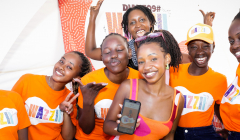
The role of young voices in creating inclusive brands
Listening to and learning from young people can help bands achieve more authentic inclusion

Men have an important role to play in creating an inclusive future for all

Once a year, International Women’s Day puts the spotlight on gender inequality, highlighting the dangers and discrimination women right across the globe face. Not surprisingly (the clue’s in the name) the focus falls on women: where and how we’re being disadvantaged, how we should take up more space both in our businesses and in the work we create and how we can accelerate change.
But women can’t solve these issues alone. So I want to use this IWD to focus on men.
It’s well documented that our industry has a ‘glass pyramid' where a majority-female cohort at entry-level transforms into a majority-male once at C-suite. But the issue isn’t just a numbers game. We need male leaders to stop unwittingly reinforcing the old Pygmalion-esque work culture of “Why can’t a woman be more like a man?”
Studies have identified leadership traits that correlate with business success: empathy, vulnerability, humility, integrity and collaboration. And although these are qualities both men and women can display, right now “if we recruited leaders on the basis of those proven-effective qualities, analysis shows 70% of them would be women.”
We have an obligation to think about how we represent gender in our work, which includes ensuring more diverse, central, active, nuanced portrayals of women. But it also means creating stories that challenge and reframe outdated notions of masculinity.
Lori Meakin, Founder at Joint
So I’d love more men to say “how can I be more like the women around me who display these qualities?”
However, when men still use “girly” as an insult, boys and their parents fear they’ll be made fun of if they play with “girls’ toys” and middle school boys when asked “what’s the best thing about being a boy?” give “not being a girl” as their second-highest answer (just behind sport), men seeing women as role models still feels like a tough ask.
We have an obligation to think about how we represent gender in our work, which includes ensuring more diverse, central, active, nuanced portrayals of women. But it also means creating stories that challenge and reframe outdated notions of masculinity.
It’s why Joint and Amazon Prime didn’t just retell Rapunzel’s story; we questioned what would happen if a historic man channelled his Napoleon complex differently. And it’s why, back in 2016, we celebrated an empathetic, vulnerable and compassionate model of masculinity in the friendship between a Vicar and Imam.
Creatives can either amplify what Grayson Perry calls the “Department of Masculinity” where men police other men to stay within the narrow confines of what ‘being a man’ means; or we could model “an emergent masculinity… that prized tolerance, flexibility, plurality and emotional literacy in the same way that strength, certainty and stoicism have been celebrated in the past.” I’d love more men to actively do the latter.
Caroline Criado-Perez demonstrates that many products, services and experiences - be they cars, protective clothing, running shoes, medicines and even transport networks, towns and cities - are designed in ways that make life more difficult and more dangerous for women. That’s simply because we’re not actively analysing how things work for women and are assuming that what’s good for men is good for everyone. If you’ve not had time to read Invisible Women, investing 50 minutes listening to her interview with Annie Macmanus is an eye-opener.
The voices of men who work in product and service design, tech and data can be hugely powerful here too. Simply asking “Are we thinking default-male here?” or ”Can we see that data sex-disaggregated?” would be a lifesaver. Literally, in some cases.
Together, by IWD 2023, maybe we’ll have moved a bit closer to workplaces, creative work and a world that works better for all of us.
Co-founder of Joint and a WACL Exec member, Lori works to engage more men and boys in gender equality, improving how women are represented in our brands, comms and businesses, to help people achieve their potential, whatever their gender.
Looks like you need to create a Creativebrief account to perform this action.
Create account Sign inLooks like you need to create a Creativebrief account to perform this action.
Create account Sign in